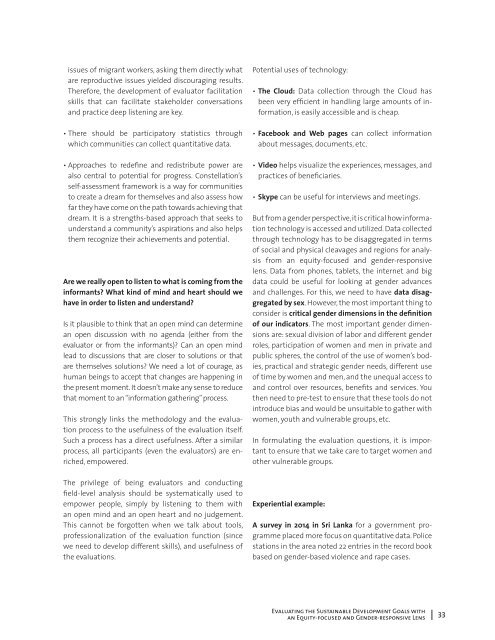NO ONE LEFT BEHIND
NY-Events-Report_WEB
NY-Events-Report_WEB
You also want an ePaper? Increase the reach of your titles
YUMPU automatically turns print PDFs into web optimized ePapers that Google loves.
issues of migrant workers, asking them directly what<br />
are reproductive issues yielded discouraging results.<br />
Therefore, the development of evaluator facilitation<br />
skills that can facilitate stakeholder conversations<br />
and practice deep listening are key.<br />
• There should be participatory statistics through<br />
which communities can collect quantitative data.<br />
• Approaches to redefine and redistribute power are<br />
also central to potential for progress. Constellation’s<br />
self-assessment framework is a way for communities<br />
to create a dream for themselves and also assess how<br />
far they have come on the path towards achieving that<br />
dream. It is a strengths-based approach that seeks to<br />
understand a community’s aspirations and also helps<br />
them recognize their achievements and potential.<br />
Are we really open to listen to what is coming from the<br />
informants? What kind of mind and heart should we<br />
have in order to listen and understand?<br />
Is it plausible to think that an open mind can determine<br />
an open discussion with no agenda (either from the<br />
evaluator or from the informants)? Can an open mind<br />
lead to discussions that are closer to solutions or that<br />
are themselves solutions? We need a lot of courage, as<br />
human beings to accept that changes are happening in<br />
the present moment. It doesn’t make any sense to reduce<br />
that moment to an “information gathering” process.<br />
This strongly links the methodology and the evaluation<br />
process to the usefulness of the evaluation itself.<br />
Such a process has a direct usefulness. After a similar<br />
process, all participants (even the evaluators) are enriched,<br />
empowered.<br />
The privilege of being evaluators and conducting<br />
field-level analysis should be systematically used to<br />
empower people, simply by listening to them with<br />
an open mind and an open heart and no judgement.<br />
This cannot be forgotten when we talk about tools,<br />
professionalization of the evaluation function (since<br />
we need to develop different skills), and usefulness of<br />
the evaluations.<br />
Potential uses of technology:<br />
••<br />
The Cloud: Data collection through the Cloud has<br />
been very efficient in handling large amounts of information,<br />
is easily accessible and is cheap.<br />
••<br />
Facebook and Web pages can collect information<br />
about messages, documents, etc.<br />
••<br />
Video helps visualize the experiences, messages, and<br />
practices of beneficiaries.<br />
••<br />
Skype can be useful for interviews and meetings.<br />
But from a gender perspective, it is critical how information<br />
technology is accessed and utilized. Data collected<br />
through technology has to be disaggregated in terms<br />
of social and physical cleavages and regions for analysis<br />
from an equity-focused and gender-responsive<br />
lens. Data from phones, tablets, the internet and big<br />
data could be useful for looking at gender advances<br />
and challenges. For this, we need to have data disaggregated<br />
by sex. However, the most important thing to<br />
consider is critical gender dimensions in the definition<br />
of our indicators. The most important gender dimensions<br />
are: sexual division of labor and different gender<br />
roles, participation of women and men in private and<br />
public spheres, the control of the use of women’s bodies,<br />
practical and strategic gender needs, different use<br />
of time by women and men, and the unequal access to<br />
and control over resources, benefits and services. You<br />
then need to pre-test to ensure that these tools do not<br />
introduce bias and would be unsuitable to gather with<br />
women, youth and vulnerable groups, etc.<br />
In formulating the evaluation questions, it is important<br />
to ensure that we take care to target women and<br />
other vulnerable groups.<br />
Experiential example:<br />
A survey in 2014 in Sri Lanka for a government programme<br />
placed more focus on quantitative data. Police<br />
stations in the area noted 22 entries in the record book<br />
based on gender-based violence and rape cases.<br />
Evaluating the Sustainable Development Goals with<br />
an Equity-focused and Gender-responsive Lens 33


